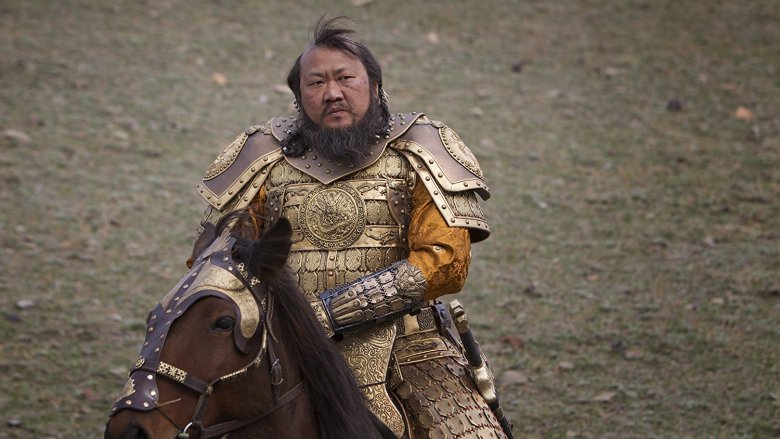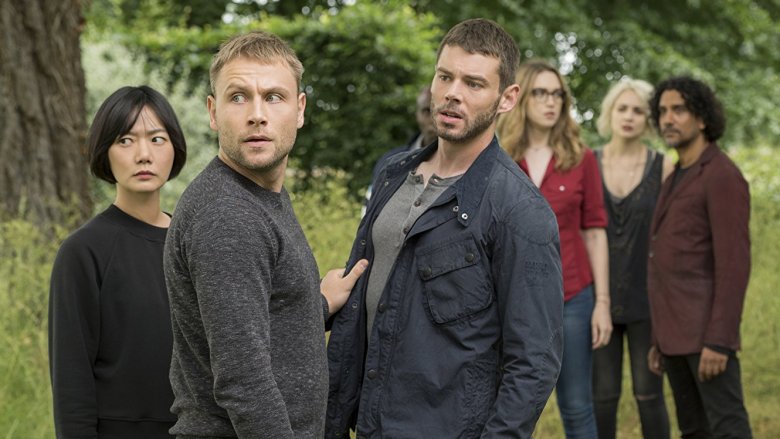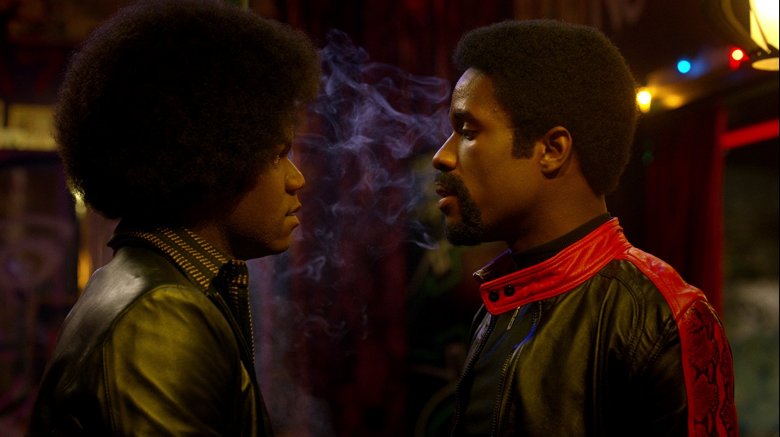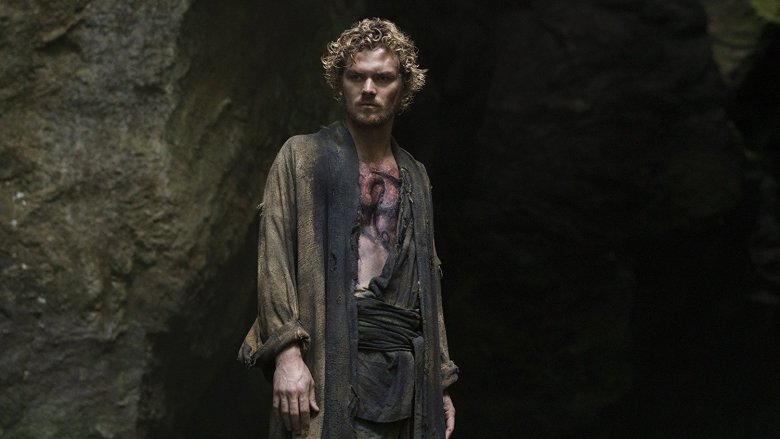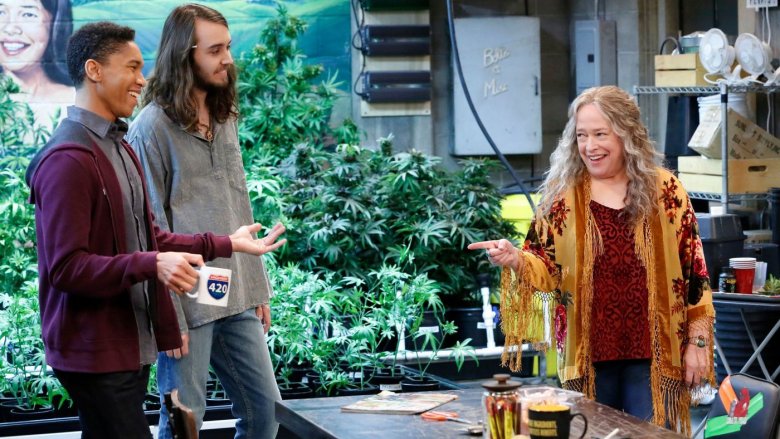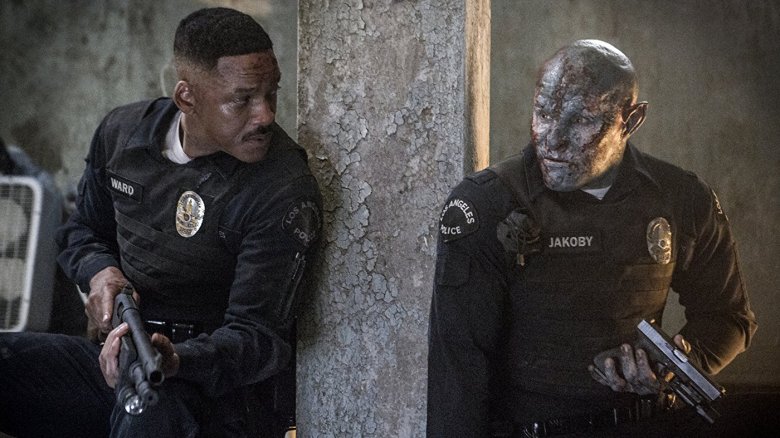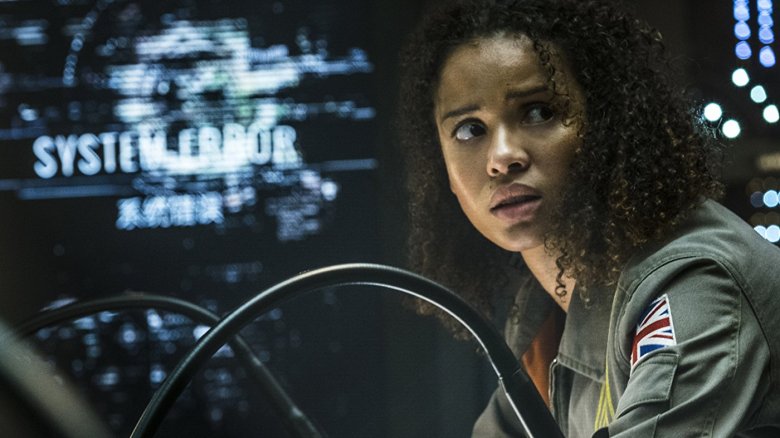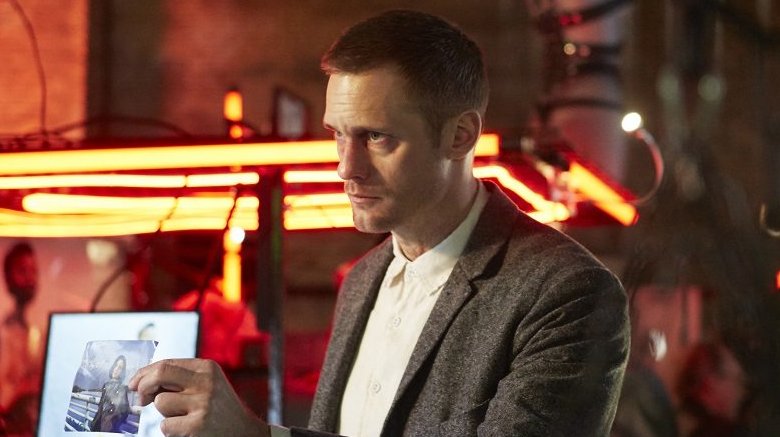Netflix Originals That Didn't Live Up To The Hype
In spite of certain film festivals choosing to give them the cold shoulder, Netflix has been ramping up its original programming slate in a big way in recent years — for better and for worse. The good news is that the streaming service's decision to dedicate so many resources to in-house content has provided a bevy of great shows and films. There have been hit series that make it a must-subscribe like Orange Is the New Black and Stranger Things, and Netflix has also given key distribution to acclaimed films like Beasts of No Nation, Mudbound, and 13th.
However, there have also been a lot of stinkers and projects that were severely over-hyped. Despite having so many projects in play at any given time, Netflix really seemed to put a lot of stock into these productions to little or no avail. No entertainment giant is perfect, and with that in mind, here's a look at some Netflix originals that didn't live up to the hype.
Marco Polo (2014)
Netflix might have had hopes of Marco Polo becoming its very own Game of Thrones-style epic, but after two very expensive seasons of the Middle Age war drama, the streaming service learned the hard way that wasn't gonna happen. Long before his fall from public grace, Marco Polo was promoted by then-producer Harvey Weinstein as "one of the most expensive shows ever done for pay TV." At the time, it was being prepared for Starz, and its bloated budget was supposed to showcase the scale of its ambition and bravado. The series ultimately landed at Netflix, propped by Netflix boss Ted Sarandos as "a timeless tale of power, adventure, betrayal and lust that combines deft storytelling and cinematic ambition."
Despite all that lofty language, however, the series was a bona fide flop. Sure, the show did earn some points for boasting a culturally appropriate cast, and the company's CEO lauded its popularity and called it a "massive success" (while keeping any numerical support for that claim close to the vest). However, after two seasons, Netflix couldn't continue funding the critically derided series and cancelled Marco Polo, with only a reported $200 million loss to show for all their efforts.
Sense8 (2015)
When the Wachowskis decided to team up for their first small-screen series, their names alone were enough to draw some enthusiastic interest in the sci-fi show. It certainly didn't hurt that Sense8 was met with mostly positive reviews and was recognized by the GLAAD Media Awards for its inclusion of LGBTQ characters.
After two seasons, however, Netflix decided to pull the plug on the series — a bit baffling to those who'd tuned in and became fans of the diverse octet of sensates, since reviews had remained strong. However, Sarandos later revealed that despite all of those positives, the show simply didn't attract enough of a following to justify its cost (about $9 million an episode). "A big expensive show for a huge audience is great. A big, expensive show for a tiny audience is hard even in our model to make that work very long," he explained. Following a roaring audience reaction to the show's cancellation, Netflix at first insisted that it couldn't justify a continuation. Weeks later, however, it did decide to bring it back for a single two-hour finale episode to offer closure.
The Get Down (2016)
Although Netflix has had to shell out some serious dough for several of its shows, The Get Down is one of its costliest projects of all. The '70s-set musical-drama cost a whopping $120 million to make (maybe even as much as $200 million), which was Netflix's priciest series until The Crown. The streaming service also pulled out all the stops to promote the series, including using graffiti art in big cities. However, since it was in the hands of Baz Luhrmann (whose credits include visual epics like Romeo + Juliet, Moulin Rouge!, Australia, and The Great Gatsby), the investment appeared sound, and favorable reviews certainly seemed to echo that.
However, the show's viewership didn't quite measure up to expectations, with just over three million pairs of eyes tuning in during the first month of its run. Although Luhrmann publicly claimed that he was backing away from the project to focus on films, and the series' set was famously plagued with problems, the show's failure to match the ratings of far less expensive original series like Orange Is the New Black and Stranger Things meant it was predictably canned after a single two-part season.
Marvel's Iron Fist (2017)
Netflix had been on a roll with its Marvel adaptations before Iron Fist. First there was Daredevil, a resounding success with critics and audiences. Then came Jessica Jones, which was also immediately heralded as an MCU must-watch, and Luke Cage absolutely crushed it as well. In contrast, Iron Fist was met with stunning disfavor, despite being heavily binged upon release after a bevy of pre-release hype which featured the talent comparing the series to its well-liked predecessors.
Not only was the inaugural season a directionless snoozefest, but critics took umbrage with the appeal of the title hero himself, dubbing him the "weak link" of the Netflix-MCU crossover collective and calling the character a "whiner." It didn't help that the show was also beset with allegations of cultural appropriation. Iron Fist's critical whomping didn't spark a downward trend for the streaming service's Marvel shows to come — The Defenders, which even included Iron Fist, was well-liked enough, and The Punisher also fared well. However, season 1 showrunner Scott Buck (who was also responsible for ABC's ill-received adaptation of Marvel's Inhumans) was still replaced for the eventual second season.
Disjointed (2017)
It isn't just punnery to say that Netflix had high hopes for Disjointed. The pot-centric series featured Kathy Bates as a cannabis shop owner in her first live-audience performance in a quarter century and was spearheaded by TV sitcom giant Chuck Lorre. In other words, it was a stoner show with solid talent before and behind the cameras. What could possibly go wrong?
Well, despite some stylized marketing efforts that included everything up to and including branded marijuana strains being doled out at a pop-up dispensary, the series simply failed to resonate with its intended audience. Even the kindest critics found it to be plagued by obvious jokes and a scattered plot that unfortunately made good on the series' name, and the show ended up being the worst-reviewed series of the summer, which burns in all the wrong ways. So, it was hardly a surprise when, after a two-part season, the show was unceremoniously snuffed out by Netflix.
Bright (2017)
No discussion of Netflix's overly hyped properties would be complete without bringing up Bright. The late 2017 sci-fi/fantasy movie was the focus of a massive bidding war that resulted in the streaming service forking over $90 million to produce the David Ayer picture with a script by Max Landis. The film featured Will Smith and Joel Edgerton as cross-species buddy cop leads — specifically, a human and an orc, the latter of which endured outcast status to mirror real-life racial tensions — and Smith even described it as "Training Day meets Lord of the Rings."
Despite an aggressive front-page promotional push by Netflix (which did result in 11 million viewers in its first three days of release), however, the reviews for the film were an absolute bloodbath. Some picked it to be the worst movie of the year, others were amused by its supersized schlock status, and there were puns aplenty about how dim Bright's reception ended up being as a whole. Even so, Netflix wasn't deterred by the bad buzz and decided to greenlight a sequel, with Ayer returning to write and direct.
The Cloverfield Paradox (2018)
To be fair to Netflix, they actually didn't spend a lot of time promoting the release of The Cloverfield Paradox, the third installment in J.J. Abrams' loosely connected series of Cloverfield films. Sure, there'd been some loose viral marketing when it was still being called The God Particle, but no one knew the actual release date of the film until it arrived. It was the method of the message's delivery that felt like a big power play: Netflix dropped the film's trailer during the 2018 Super Bowl and revealed that it'd be available for streaming just after the game was over.
Thanks to the unexpected success of the first sequel, 10 Cloverfield Lane, and Paradox's depth of talent on the cast (including Gugu Mbatha-Raw, David Oyelowo, Chris Dowd, Elizabeth Debicki, Ziyi Zhang and Daniel Brühl), the film was watched by five million people during its first week online. Despite that (particle-)accelerated attention and savvy marketing, though, the film was absolutely eviscerated by critics, who were even more disappointed in the film after its major marketing splash.
Mute (2018)
Duncan Jones waited a long time to make Mute, the so-called "spiritual sequel" to his stunning 2009 sci-fi film Moon, and he made sure everyone knew just how important the project was to him along the way. For years, the writer-director touted Mute as everything from his own homage to Blade Runner to the science-fiction version of Casablanca, so when Netflix finally helped usher the 16-years-in-the-making movie into reality, Jones fans were definitely paying attention (the massive letdown of his previous project, Warcraft, notwithstanding).
Perhaps Jones should've let the film percolate a few more years, however, because the ultimate product was lackluster, to put it kindly. Whereas Jones' first two films were roundly praised for being well-acted, exciting and thought-provoking, Mute was panned for being exactly the opposite. After all that build-up, what resulted was an ultimately lifeless, disorganized, and derivative film that didn't come anywhere near living up to the expectations set by its creator.
